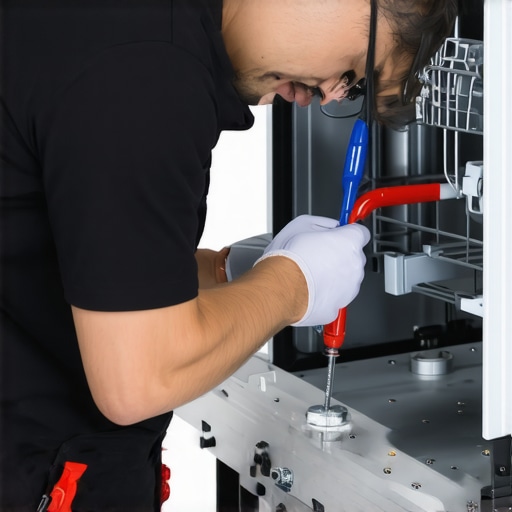My Unexpected Dishwasher Dilemma: A Personal Wake-up Call
One busy Saturday, I was ready to tackle a mountain of dishes when I noticed my dishwasher was acting up. It wasn’t draining properly, and I felt that sinking feeling—oh no, not again! Having faced similar appliance issues before, I knew that quick diagnosis could save me both time and money. Sharing my journey might help you troubleshoot your dishwasher effectively, just like I did.
Understanding Common Dishwasher Failures: My Journey to Solutions
My first step was to identify the common signs of dishwasher problems. I learned that issues like failure to start, poor cleaning, or leaks often have simple causes, from clogged filters to faulty door latches. For example, I discovered that a blocked drain filter was the culprit in my case, which I cleared following tips from reliable sources like Energy.gov. This quick fix restored the drainage and saved me a costly repair.
How Do I Know When to Call a Professional?
While I prefer to troubleshoot first, some problems are better left to the pros. For instance, if your dishwasher isn’t heating water or the motor makes strange noises, it might be time to consult an expert. I’ve learned that understanding your appliance’s symptoms can guide you in deciding whether DIY fixes are sufficient or if professional diagnosis is wiser. For comprehensive diagnostic tips, check out this helpful guide.
What are the most overlooked causes of dishwasher failure?
Sometimes, simple issues like a tripped circuit breaker or a clogged spray arm can cause major problems. I once overlooked a loose water inlet hose, which led to water leakage. Regularly inspecting these components can prevent bigger issues down the road. If you’re unsure, troubleshooting guides can offer step-by-step instructions to help you identify hidden problems.
If you’re like me, eager to maximize your appliance’s lifespan and avoid unnecessary repairs, I recommend exploring detailed troubleshooting strategies and warranty tips. Feel free to share your experiences or ask questions—I’d love to hear how you tackled your dishwasher problems!
Can Preventative Maintenance Save Your Dishwasher from Costly Breakdowns?
Many homeowners overlook the importance of routine maintenance, assuming their dishwasher will run smoothly without extra care. However, seasoned appliance technicians emphasize that proactive steps can significantly extend the lifespan of your appliance and prevent unexpected failures. Simple practices like regularly inspecting and cleaning spray arms, filters, and door seals can make a profound difference. For instance, I routinely check my dishwasher’s spray arms for clogs, ensuring water flows freely during cycles, which keeps the cleaning performance optimal and avoids strain on the motor.

What Are the Hidden Clues That Indicate Your Dishwasher Is Heading Toward Failure?
Experts advise paying attention to subtle signs that may signal impending issues. Unusual noises, longer cycle times, or inconsistent draining are often early indicators. I once noticed my dishwasher making a grinding sound during operation—an alert to check the motor and bearings. Addressing these hints early can prevent more severe damage and costly repairs down the line. Regularly reviewing your appliance’s performance and consulting trusted resources like this diagnostic guide can help you identify problems before they escalate.
How Do I Choose the Right Professional Help for My Dishwasher Troubles?
While DIY troubleshooting is valuable, knowing when to call in a professional is crucial. If your dishwasher has electrical issues, persistent leaks, or fails to heat water despite basic fixes, an expert’s diagnosis is essential. Skilled technicians use advanced diagnostic tools to pinpoint problems that might be invisible to an untrained eye, saving you time and preventing further damage. Exploring reputable repair services and understanding your warranty terms can also optimize your repair experience—check out this resource for more insights.
Are There Common Overlooked Causes of Dishwasher Failures That Experts Know About?
Absolutely. Many appliance failures stem from overlooked issues like mineral buildup in water supply lines, worn-out door latches, or clogged filters that homeowners neglect during routine cleaning. For example, I discovered that mineral deposits in my water inlet valve were causing inconsistent water flow, which I resolved by descaling the component. Recognizing and addressing these less obvious problems can keep your dishwasher running smoothly and save you from unnecessary repairs. Regular inspections and maintenance, guided by expert advice, are your best defense against unexpected failures.
If you’re eager to learn more about advanced troubleshooting techniques, I recommend exploring comprehensive guides and expert tips. Share your own experiences in the comments or suggest topics you’d like me to cover next—I’d love to hear how you’re keeping your appliances in top shape!
Beyond the Basics: Tackling the Hidden Nuances of Dishwasher Repairs
Over the years, I’ve come to realize that dishwasher issues often hide beneath the surface, requiring a more nuanced approach than just following standard troubleshooting steps. For instance, I once faced a stubborn leak that persisted despite cleaning the obvious seals and filters. It turned out that mineral buildup inside the water inlet valve was causing micro-leaks, a detail I had initially overlooked. This experience taught me the importance of considering less apparent causes, such as mineral deposits and corrosion, especially in areas with hard water. Exploring specialized descaling solutions or even replacing worn components can make a significant difference, as highlighted by experts in appliance repair guides like this detailed diagnostic resource.
How Can I Use Advanced Diagnostic Techniques to Prevent Major Failures?
In my journey, I’ve found that investing in a multimeter and learning to read electrical signals can save a lot of frustration. Testing the wiring and control boards helps identify faulty components before they cause complete breakdowns. For example, I once used a multimeter to verify the continuity of the door latch switch, preventing a more costly repair. Combining this approach with regular visual inspections—checking for burnt or loose wires—has been invaluable. For detailed guidance on such diagnostic methods, I recommend exploring this comprehensive guide. It’s a game-changer for DIY enthusiasts eager to develop a deeper understanding of their appliances.
How Do I Balance DIY Repairs with Professional Help When It Counts?
While I advocate for DIY troubleshooting, I’ve learned that some issues are best left to professionals—particularly those involving electrical components or complex motor failures. My rule of thumb is to attempt basic fixes, such as clearing filters or resetting circuit breakers, but to call in a technician if the problem persists or if I notice signs of electrical trouble. Hiring a qualified technician not only ensures safety but also prolongs the lifespan of my dishwasher. To make the most of this, I always review warranty terms and seek reputable repair services—more tips can be found in this resource.
What Are the Subtle Signs That Indicate My Dishwasher Is Nearing the End of Its Life?
Over time, I’ve become attuned to minor cues—like a slight delay in cycle completion, increased noise levels, or inconsistent water temperatures—that hint at underlying wear. Recently, I noticed my dishwasher’s motor making faint grinding sounds, prompting me to investigate further. Addressing these early warnings by inspecting motor bearings or considering part replacements can save a lot of money and hassle. Regular maintenance, combined with attentive observation, is essential. If you’re curious about diagnosing such subtle signs, this diagnostic guide offers excellent insights.
How Can I Prevent Hard Water Damage and Mineral Buildup?
Living in an area with hard water has made me realize the importance of preventive measures. Installing a water softener or using descaling agents periodically can reduce mineral deposits that clog spray arms and valves. I also make it a habit to regularly inspect and clean the spray arms and filters—sometimes, a simple vinegar soak can dissolve stubborn deposits. These proactive steps help maintain optimal water flow and prevent expensive repairs down the line. For more tips on water-related issues, I recommend reviewing this expert advice.
If you’ve faced similar challenges or discovered effective tricks, I’d love for you to share your experiences or ask questions in the comments. Together, we can build a community of informed homeowners who keep their appliances running smoothly and efficiently.
Unveiling the Subtle Signs of Impending Dishwasher Failures
Over time, I’ve learned that minor anomalies often precede major breakdowns. For instance, a slight delay in cycle initiation or faint electrical burning odors can be early clues. Once, I detected a faint humming noise that gradually intensified, prompting me to inspect the motor bearings and wiring connections. Addressing these subtle cues promptly can dramatically reduce repair costs and extend your appliance’s longevity. For those seeking in-depth diagnostic techniques, exploring this expert guide offers invaluable insights.
Advanced Diagnostic Techniques to Prevent Costly Failures
My experience has shown that equipping oneself with a multimeter and learning to interpret electrical signals is transformative. Testing the control board, wiring harnesses, and door latch switches allows early detection of faulty components. For example, verifying the continuity of the heating element prevented a complete water heating failure. Combining electrical diagnostics with visual inspections—such as checking for burnt wires or corrosion—has proven to be an effective strategy. To hone these skills, I recommend reviewing this comprehensive resource, which demystifies complex troubleshooting processes.
Balancing DIY Repairs with Professional Expertise
While I advocate for a proactive DIY approach, I’ve recognized that some issues warrant professional intervention—especially when dealing with electrical faults or motor failures. My rule of thumb is to attempt simple fixes like resetting circuit breakers or cleaning filters, but to seek qualified help if problems persist or if there are signs of electrical arcing. Engaging reputable technicians not only ensures safety but also preserves warranties. To maximize your repair investment, reviewing this guide can be instrumental.
How Can I Use Advanced Troubleshooting to Extend My Dishwasher’s Lifespan?
Investing in diagnostic tools like multimeters and learning to interpret control signals empowers you to catch issues early. Regularly testing components such as the motor, sensors, and control boards helps prevent sudden failures. Additionally, maintaining a detailed repair log aids in tracking recurring problems and planning preventative measures. For seasoned insights into these techniques, I encourage exploring this authoritative resource. Sharing your own experiences or challenges can enrich our community’s knowledge—feel free to comment below or reach out with your stories.
Addressing Hard Water Damage: Proactive Strategies
Living in a hard water zone has made me acutely aware of mineral buildup issues. Installing a water softener and using descaling agents periodically has significantly reduced clogging in spray arms and inlet valves. I’ve also adopted a routine of soaking parts in vinegar to dissolve mineral deposits, which keeps water flow optimal. These preventive measures safeguard against costly repairs and maintain cleaning efficiency. For comprehensive strategies on managing water quality impacts, check out this expert advice.
If you’ve uncovered additional techniques or faced unique challenges, I invite you to share your insights. Our collective knowledge can help all of us keep our dishwashers running smoothly and efficiently, saving money and enhancing appliance longevity.
Things I Wish I Knew Earlier (or You Might Find Surprising)
The Subtle Signs of Trouble
One thing I’ve learned over the years is that odd noises or slight delays in cycles are often early warning signs. I once ignored a faint humming sound, which eventually led to a costly motor repair. Paying attention to these subtle cues can save you a lot of money and stress.
Mineral Buildup Isn’t Just a Nuisance
Living in a hard water area, I used to dismiss mineral deposits as minor. However, I discovered that they can clog spray arms and valves, causing poor cleaning and leaks. Regular descaling and inspections have become part of my routine to keep the dishwasher running smoothly.
DIY Isn’t Always Enough
While I love troubleshooting on my own, I’ve found that electrical issues or complex motor failures are best left to professionals. Knowing when to call a technician can prevent accidents and further damage.
Routine Maintenance Is Your Best Friend
Simple steps like cleaning filters, inspecting door seals, and checking spray arms regularly can make a huge difference. It’s like giving your dishwasher a health check-up—preventive care really pays off.
Hard Water Can Be a Hidden Enemy
Using a water softener or descaling agents periodically has helped me prevent mineral buildup. These proactive measures are worth the effort, especially in areas with hard water, to extend your appliance’s lifespan.
Resources I’ve Come to Trust Over Time
- Energy.gov: This government site offers reliable maintenance tips and troubleshooting guides that are easy to follow, making it a go-to resource for me.
- Appliance Repair Guides (applianceoutletpro.com): Their detailed diagnostic tips help me understand complex issues and decide when DIY is feasible.
- Manufacturer’s Manuals: Always a trustworthy source for specific model troubleshooting and warranty info, which can save a lot of hassle.
Parting Thoughts from My Perspective
Dealing with dishwasher issues has taught me the value of attentive maintenance, recognizing early warning signs, and knowing when to seek professional help. These lessons have saved me money and extended my appliance’s life. If this resonates with you, I’d love to hear your experiences or tips. Remember, a well-maintained dishwasher not only works better but also lasts longer—investing a little time now can pay off big later. Share this post with someone who might find it helpful, and don’t hesitate to drop your own insights in the comments!

